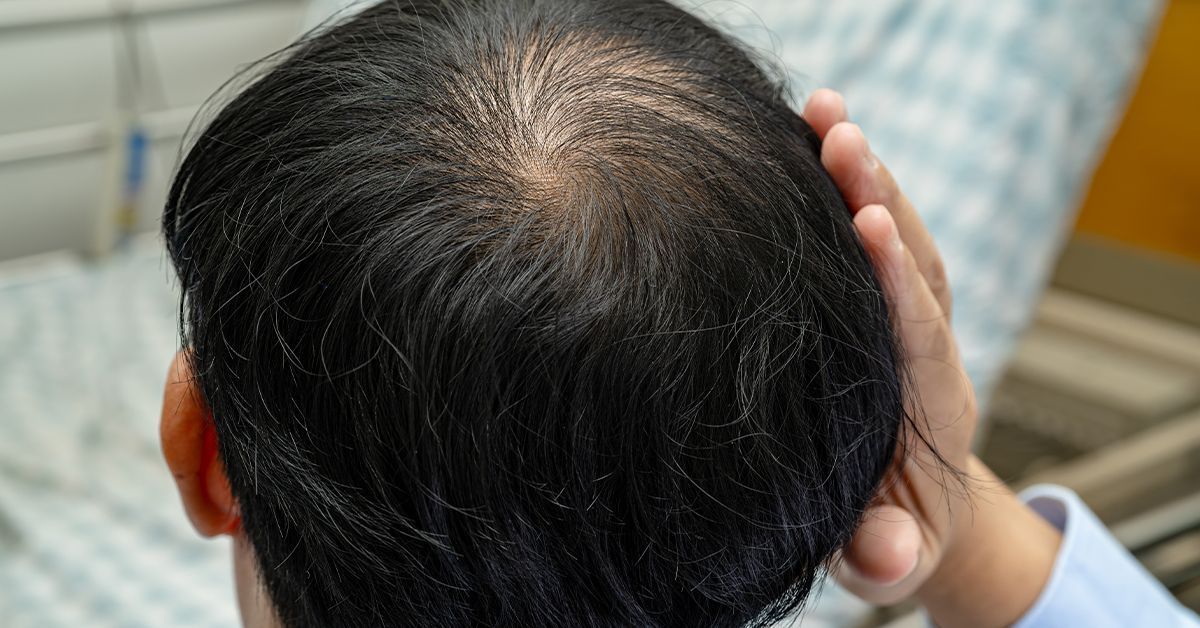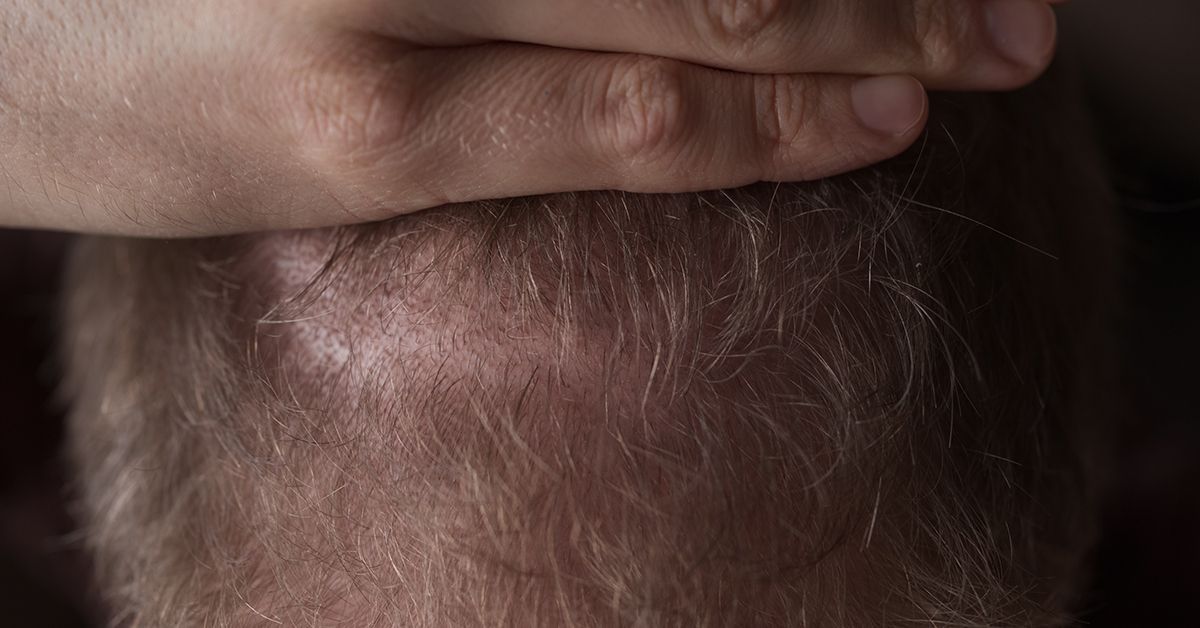Diseases and Hair Loss
Human health is complicated and so is our hair health. The interconnectedness of the human endocrine system and other health factors – and their impact on hair health and hair loss – is a growing area of research and information.
We know that there are certain health conditions and diseases that can lead to hair loss. The worst of them, generally, are autoimmune conditions which can themselves cause hair loss or can create hair loss as a side effect of treatment.
What Autoimmune Disease Can Cause Hair Loss?
Graves Disease (and other forms of hypo- and hyperthyroidism) can lead to loss of hair. According to the Cleveland Clinic, “In fact, thyroid dysfunction can cause you to not only shed hair, but also to stop growing hair altogether. Fortunately, this usually is not permanent. But it can be a common symptom of your thyroid’s hormone production not working correctly.”
Graves’ Disease is one cause of hyperthyroidism which happens when your thyroid produces too much hormone and throws your body’s endocrine system into overdrive. Hashimoto’s thyroiditis does the exact opposite… keeping your thyroid from producing enough. And they both can cause thinning hair or even push your hair into telogen effluvium.
But thyroid disease is not the only culprit in autoimmune-related hair loss. According too Good Rx, several autoimmune conditions can cause hair loss including:
- Systemic lupus erythematosus
- Discoid lupus
- Hashimoto’s thyroiditis (and hypothyroidism in general)
- Graves’ disease (and hyperthyroidism in general)
- Dermatomyositis
- Scleroderma
Psoriasis causes damage to the skin which leads to hair loss. In addition, digestive disorders like celiac disease – or even irritable bowel syndrome – can have an impact on hair loss. In some cases (such as with celiac disease), it is about how well your body is able to obtain the nutrients it needs to support hair growth. In other cases (like thyroid disorders), it is about how your body’s hormones impact your hair health.
Still others, like alopecia areata, are autoimmune diseases that specifically target your hair. People with alopecia areata find that their body is actively attacking the hair follicles, causing them to be damaged and hair to fall out. If the hair follicle is severely damaged, it may be unable to move to the next cycle of hair growth… leading to increasing baldness.
How Do I Stop Autoimmune Hair Loss?
In most cases, you treat autoimmune hair loss by treating the underlying condition. For example, in thyroid disorders most patients receive daily medication to suppress or increase thyroid hormones. For patients with lupus, a variety of medications (mostly immunosuppressants) are used to prevent the body from attacking itself.
With alopecia areata, the most common form of treatment is corticosteroid injections. But some progress has been made with other drug treatments and phototherapy.
When you are experiencing autoimmune hair loss, the first and most important thing to do is to find the cause. That may come from your primary care doctor, an endocrinologist or other specialist, or from your hair specialist.
H2T Hair Restoration Can Diagnose and Treat Your Hair Loss
At H2T Hair Restoration, our team can help you identify if your skin is the problem, if your body is attacking your hair, or if you need to see a different specialist. And, in the meantime, we can help you fight the symptoms of your autoimmune disease – your hair loss. If you aren’t sure what is causing your hair loss, contact us today to book a consultation. We can help you find the answers you need.

H2T Skin and Laser Center Gift Cards are now available to purchase online!
Online Specials:
Age Jet: Face, Eyes and Neck for just $1500. Save $750
BHRT: Quest Hormone level testing for just $149
D-List Vitamin Shots: Series of 6 for just $300
ZO Club: Pre-pay for ZO and Save!
NORWOOD
6 Central St Norwood, MA 02062
Phone:
(781) 352-2531
- Monday
- Closed
- Tuesday
- -
- Wednesday
- Appointment Only
- Thursday
- -
- Friday
- -
- Saturday
- Appointment Only
- Sunday
- Closed
FOXBORO
17 Cocasset St Foxboro, MA 02035
Phone:
(508) 543-1112
- Monday
- -
- Tuesday
- -
- Wednesday
- -
- Thursday
- -
- Friday
- -
- Saturday
- -
- Sunday
- Appointment Only
FRANKLIN
435 King Street Franklin, MA 02038
Phone:
(508) 530-9600
- Monday
- -
- Tuesday
- -
- Wednesday
- -
- Thursday
- -
- Friday
- -
- Saturday
- -
- Sunday
- Closed
Same Day Service Hours
We know life gets busy and it can be hard to plan ahead, especially when it comes to making time for yourself!
To help you manage your life and still be able to sneak in some self-care when you find yourself with a few hours, we are now offering same day service appointments in all three locations.
You can simply call the day you are free at your location of choice and book the appointment for the time that works for you!
Norwood
Same Day Service Hours
Tuesday: 12:00pm-8:00pm
Wednesday: 10:00pm - 6:00pm
Thursday: 10:00pm - 6:-00pm
Friday: 10:00am -4:00pm
All medical aesthetics services including injectables available!
Foxboro
Same Day Service Hours
Monday: 9:00am - 3:00pm
Tuesday: 11:00am - 8:00pm
Wednesday: 9:00am - 6:00pm
Thursday: 11:00am - 8:00pm
Friday: 9:00am - 4:00pm
All medical aesthetics services including injectables and Microblading consults available!
Franklin
Same Day Service Hours
Monday: 10:00am - 6:00pm
Tuesday: 9:30pm - 8:00pm
Wednesday: 10:00 - 6pm
Thursday: 9:30pm - 8:00pm
Friday: 10:00am - 4:00pm
Saturday: 10:00am - 4:00pm (Microblading consults available until 2pm every other saturday)
All medical aesthetics services including injectables (except where noted) available!





